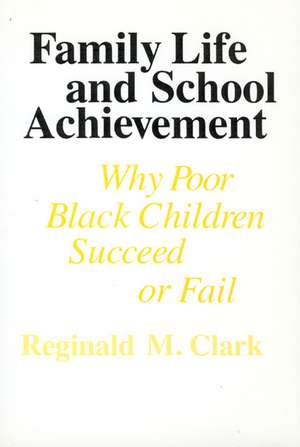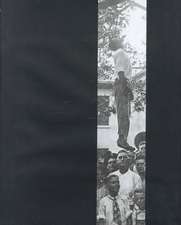Family Life and School Achievement: Why Poor Black Children Succeed or Fail
Autor Reginald M. Clarken Limba Engleză Paperback – 30 sep 1984
Working mothers, broken homes, poverty, racial or ethnic background, poorly educated parents—these are the usual reasons given for the academic problems of poor urban children. Reginald M. Clark contends, however, that such structural characteristics of families neither predict nor explain the wide variation in academic achievement among children. He emphasizes instead the total family life, stating that the most important indicators of academic potential are embedded in family culture.
To support his contentions, Clark offers ten intimate portraits of Black families in Chicago. Visiting the homes of poor one- and two-parent families of high and low achievers, Clark made detailed observations on the quality of home life, noting how family habits and interactions affect school success and what characteristics of family life provide children with "school survival skills," a complex of behaviors, attitudes, and knowledge that are the essential elements in academic success.
Clark's conclusions lead to exciting implications for educational policy. If school achievement is not dependent on family structure or income, parents can learn to inculcate school survival skills in their children. Clark offers specific suggestions and strategies for use by teachers, parents, school administrators, and social service policy makers, but his work will also find an audience in urban anthropology, family studies, and Black studies.
To support his contentions, Clark offers ten intimate portraits of Black families in Chicago. Visiting the homes of poor one- and two-parent families of high and low achievers, Clark made detailed observations on the quality of home life, noting how family habits and interactions affect school success and what characteristics of family life provide children with "school survival skills," a complex of behaviors, attitudes, and knowledge that are the essential elements in academic success.
Clark's conclusions lead to exciting implications for educational policy. If school achievement is not dependent on family structure or income, parents can learn to inculcate school survival skills in their children. Clark offers specific suggestions and strategies for use by teachers, parents, school administrators, and social service policy makers, but his work will also find an audience in urban anthropology, family studies, and Black studies.
Preț: 282.94 lei
Nou
Puncte Express: 424
Preț estimativ în valută:
54.17€ • 55.71$ • 44.94£
54.17€ • 55.71$ • 44.94£
Carte tipărită la comandă
Livrare economică 19 februarie-05 martie
Preluare comenzi: 021 569.72.76
Specificații
ISBN-13: 9780226107707
ISBN-10: 0226107701
Pagini: 264
Dimensiuni: 152 x 229 x 20 mm
Greutate: 0.35 kg
Ediția:Revised
Editura: University of Chicago Press
Colecția University of Chicago Press
ISBN-10: 0226107701
Pagini: 264
Dimensiuni: 152 x 229 x 20 mm
Greutate: 0.35 kg
Ediția:Revised
Editura: University of Chicago Press
Colecția University of Chicago Press
Cuprins
Acknowledgments
Foreword by Edgar Epps
1. The Issue
2. Research Methods
3. The Family Life of High Achievers in Two-Parent Homes
4. The Family Life of High Achievers in One-Parent Homes
5. An Analysis of Dispositions and Life-Styles in High Achievers' Homes
6. The Family Life of Low Achievers in Two-Parent Homes
7. The Family Life of Low Achievers in One-Parent Homes
8. An Analysis of Dispositions and Life-Styles in Low Achievers' Homes
9. The Family and the Bases for Academic Achievement
10. Families and Futures
Notes
Bibliography
Foreword by Edgar Epps
1. The Issue
2. Research Methods
3. The Family Life of High Achievers in Two-Parent Homes
4. The Family Life of High Achievers in One-Parent Homes
5. An Analysis of Dispositions and Life-Styles in High Achievers' Homes
6. The Family Life of Low Achievers in Two-Parent Homes
7. The Family Life of Low Achievers in One-Parent Homes
8. An Analysis of Dispositions and Life-Styles in Low Achievers' Homes
9. The Family and the Bases for Academic Achievement
10. Families and Futures
Notes
Bibliography












